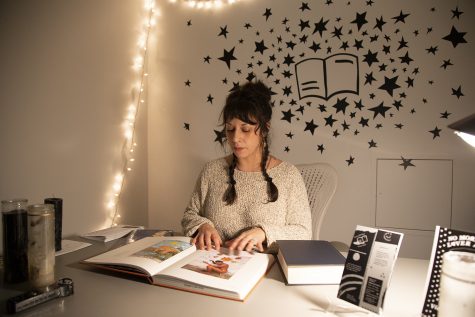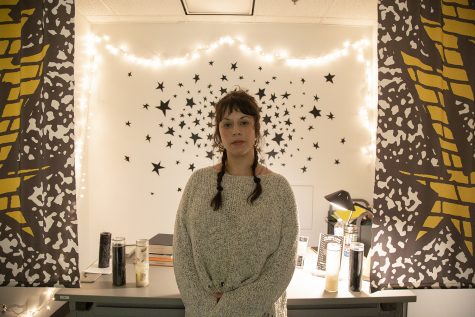Glimpse into the future at Columbia’s Library
October 29, 2019

Artist-in-residence Julia Arredonso hosts sessions to foresee people’s future using books.
With string lights, decals, electronic candles and lightning bolt tapestries lining the walls, Artist-in-Residence and interdisciplinary graduate student Julia Arredondo managed to artfully transform her small office into a cozy space for predicting the future.
With my eyes closed, I flipped through the book “Ghetto Tarot” by Alice Smeets and chose the Nine of Wands, which shows a man with a bandage on his head holding a broom, standing in front of eight identical brooms.
Upon looking at the card, I had no idea what this could possibly mean. But this is how Arredondo predicts people’s future.
Using a book of tarot interpretations, Arredondo said the card means, “Even if you feel defeated, there is still enough strength to pull through until the end.”
This was the moment of clarity I wanted. With “senioritis” in full swing, it has been difficult to get the motivation to pull through to the end of the semester, but this passage gave me some hope.
As part of her residency, Arredondo will host bibliomancy sessions—or the use of books to foresee people’s future or answer specific questions—from now until Dec. 1 at Columbia’s Library, 624 S. Michigan Ave. Part of her goal as artist-in-residence is to bring more engagement to the library, she said.

As an artist-in-residence, Julia Arredonso aims to improve engagement with Columbia’s Library, 642 S. Michigan Ave.
Arredondo has been working on divination techniques, seeking to foretell future events through supernatural means, for nearly three years and much of her artwork is inspired by traditional and alternative spiritual practices. She said she wanted to use books for the readings because she has never had good luck with tarot cards.
“I’ve always had a really close relationship with books,” she said. “I feel like they choose you. The books are in our lives for a specific reason because there are so many books in the world.”
During the session the participant has to choose a book—usually a book of proverbs—close their eyes and hold the book at both ends. Then, Arredondo explained, the participant has to familiarize themselves with the book by flipping through the pages until they find a page that feels right to them.
“I had my lover getting a reading and I pulled, ‘No man is necessary,’ in front of him. So that’s the attitude of this book,” she said.
Arredondo tries to use books that are nondenominational to keep the readings neutral and appeal to skeptics. She said it is a unique way to get out of the “rational mindset” and the everyday grind.
“As students, we get caught up in our to-do lists and our tasks and homework,” Arredondo said. “Sometimes taking a second to take in the bigger picture is necessary. I feel that this helps with that in a really playful way.”
She said bibliomancy is a personal process and it is something that can be done at home.
“You have the power to control your fate, you have the power to interpret any proverb in a bright light,” Arredondo said.







